
Free Indian Astrology: From Sacred Texts to Online Courses and Top Astrologers
September 5, 2025 | 15 mins read
Free Indian Astrology: From Sacred Texts to Online Courses and Top Astrologers
The Enduring Legacy of Jyotish: A Sacred Science
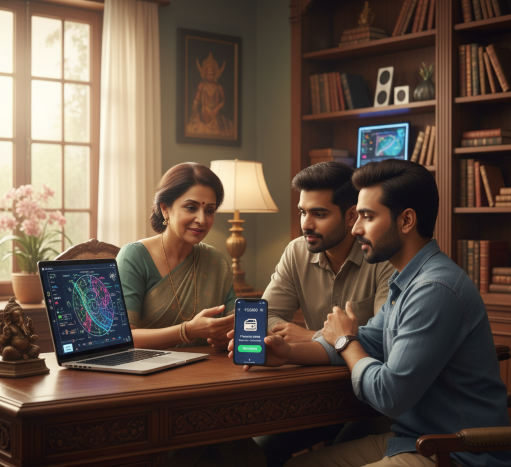
The philosophical core of Jyotish is deeply intertwined with the concepts of destiny and free will. According to the Vedas, a person’s future is a product of both these forces, and their thoughts and actions—their karma—shape their future destiny. Vedic astrology is, therefore, a map of this karma, designed to help individuals understand their true nature and navigate their lives toward fulfilling the four goals of human life ( purusharthas): dharma (purpose or righteous conduct), artha (the acquisition of wealth and security), kama (desire), and moksha (spiritual liberation). This ancient understanding positions the practice as a life-transforming tool rather than a simple predictive mechanism. The historical evolution of Jyotish from an astronomical science to a profound system for understanding personal karma demonstrates that the field is inherently dynamic. This tradition of adaptation provides a logical foundation for the new era of astrology, where modern technology is simply the latest tool to meet society's evolving needs for guidance and self-understanding.
Navigating the Complex Cosmos of Indian Astrology
One of the most foundational distinctions in the world of celestial prediction is the difference between Vedic and Western astrology. A primary point of confusion for beginners is the use of different zodiacs. Vedic astrology is based on the sidereal zodiac, which accounts for the Earth’s axial wobble, a phenomenon known as precession. This wobble causes the Earth’s ecliptic plane to shift by approximately one degree every 72 years, and over the past 2,000 years, this has created a noticeable astronomical time shift. As a result, the Vedic system uses an astronomically accurate, updated ecliptic path, while Western astrology adheres to the old, symbolic, and fixed path. This intellectual distinction highlights the logical and scientific rigor that is inherent in the Jyotish tradition.
The discipline of Indian astrology is far from a monolithic practice. It encompasses several diverse and intricate schools of thought, each with its own methodology and purpose. This variety demonstrates that a truly competent practitioner must have a multi-faceted understanding of the field.
- Vedic Astrology (Jyotish): This is the classical system, rooted in the Vedas. It relies on the sidereal zodiac, divisional charts (Shodasha Vargas), and the Vimshottari Dasha system to time events. Its primary purpose is to provide a comprehensive life map, offering insights into an individual's karma, spirituality, and overall life path. Free Vedic Astrology and Numerology With Vivek Vats Sir Link
- KP Astrology: A more modern, technology-driven system developed by the late Prof. K.S. Krishnamurti, KP astrology focuses on the Nakshatras (stellar constellations) for hyper-specific and precise predictions. It differs from the traditional Vedic system by using c ups (the connecting nodes of two houses) and a different Ayanamsha to pinpoint the timing of events with greater accuracy. Free KP Astrology With Prof Krishna Murli Eswar Sir Link
- Lal Kitab Astrology: This is a highly practical offshoot of Vedic astrology, written in Persian/Urdu, with a unique set of principles. The system is less ritualistic, providing simple, accessible remedies and placing a greater emphasis on the houses rather than the zodiac signs. It operates on the unique principle that every birth chart has a fixed Aries ascendant, and its focus is on correcting previous life's karma through easy-to-implement dos and don’ts. Free Lal Kitab Astrology With Dr. Mahesh Mankar Sir Link
- Nadi Astrology India: A deeply esoteric branch, Nadi astrology India is based on the belief that the lives of many individuals were foreseen and recorded on ancient palm leaves by sages like Maharishi Agastya thousands of years ago. A seeker is guided to their specific leaf by their thumbprint, and the reading is seen as a direct reflection of their karma. This system is considered highly detailed and accurate but requires an extremely precise birth time and the astrologer to physically possess the correct leaf for a reading to be performed. Free Nadi Astrology With Dinesh Guruji Sir Link
The existence of these diverse methodologies indicates that a truly effective practitioner must be well-versed in more than one system. The differences in approach—for example, KP's focus on precise timing versus Lal Kitab's emphasis on practical remedies—highlights the need for a comprehensive and multi-disciplinary education. This complexity provides a powerful argument for a structured learning environment that teaches a holistic curriculum, enabling students to choose the best approach for a given problem. The intellectual nature of these systems, grounded in astronomical and mathematical principles, provides a strong counterpoint to the common misconception of astrology as a superstition. It frames the subject as a structured discipline with logical foundations, appealing to those seeking more than just mystical answers.
In astrology, the stars are more than just distant lights. They are a map, a guide to understanding ourselves and our journey. While many are familiar with a simple zodiac sign reading, the world of astrology is far more intricate, with multiple systems offering different insights.
Here's a look at some of the most respected forms of Indian astrology, each with its unique approach to helping you navigate your path.
Vedic Astrology (Jyotish)
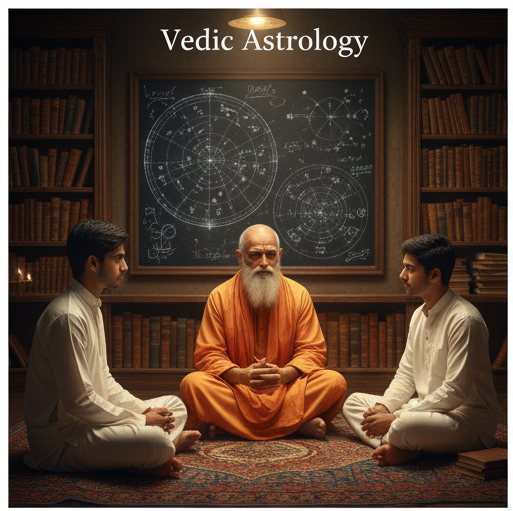
KP Astrology
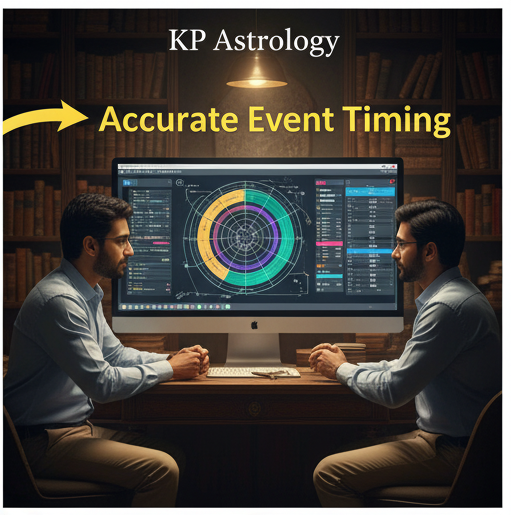
Lal Kitab Astrology
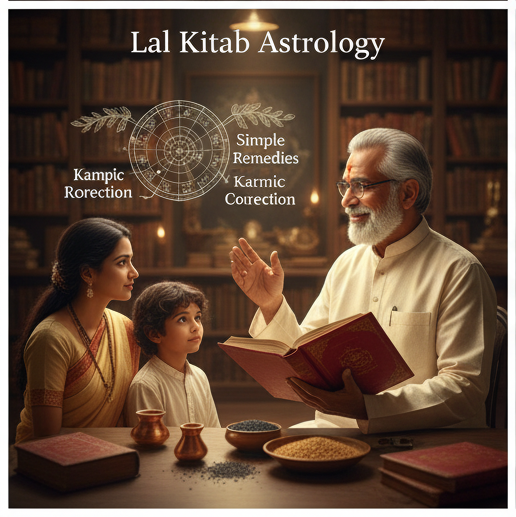
Nadi Astrology
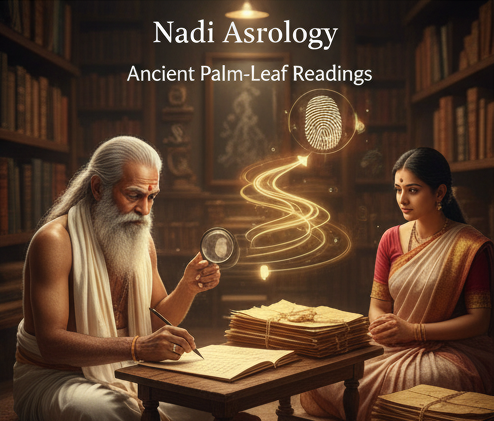
The Digital Renaissance: From Sacred Spaces to Online Services
The Path to Mastery: Learning Indian Astrology in the Digital Age


Final Thoughts and a Call to Action
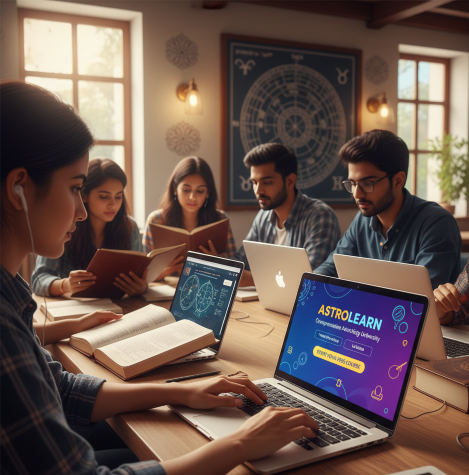
Free Indian Astrology: From Sacred Texts to Online Courses and Top Astrologers
The Enduring Legacy of Jyotish: A Sacred Science

The philosophical core of Jyotish is deeply intertwined with the concepts of destiny and free will. According to the Vedas, a person’s future is a product of both these forces, and their thoughts and actions—their karma—shape their future destiny. Vedic astrology is, therefore, a map of this karma, designed to help individuals understand their true nature and navigate their lives toward fulfilling the four goals of human life ( purusharthas): dharma (purpose or righteous conduct), artha (the acquisition of wealth and security), kama (desire), and moksha (spiritual liberation). This ancient understanding positions the practice as a life-transforming tool rather than a simple predictive mechanism. The historical evolution of Jyotish from an astronomical science to a profound system for understanding personal karma demonstrates that the field is inherently dynamic. This tradition of adaptation provides a logical foundation for the new era of astrology, where modern technology is simply the latest tool to meet society's evolving needs for guidance and self-understanding.
Navigating the Complex Cosmos of Indian Astrology
One of the most foundational distinctions in the world of celestial prediction is the difference between Vedic and Western astrology. A primary point of confusion for beginners is the use of different zodiacs. Vedic astrology is based on the sidereal zodiac, which accounts for the Earth’s axial wobble, a phenomenon known as precession. This wobble causes the Earth’s ecliptic plane to shift by approximately one degree every 72 years, and over the past 2,000 years, this has created a noticeable astronomical time shift. As a result, the Vedic system uses an astronomically accurate, updated ecliptic path, while Western astrology adheres to the old, symbolic, and fixed path. This intellectual distinction highlights the logical and scientific rigor that is inherent in the Jyotish tradition.
The discipline of Indian astrology is far from a monolithic practice. It encompasses several diverse and intricate schools of thought, each with its own methodology and purpose. This variety demonstrates that a truly competent practitioner must have a multi-faceted understanding of the field.
- Vedic Astrology (Jyotish): This is the classical system, rooted in the Vedas. It relies on the sidereal zodiac, divisional charts (Shodasha Vargas), and the Vimshottari Dasha system to time events. Its primary purpose is to provide a comprehensive life map, offering insights into an individual's karma, spirituality, and overall life path. Free Vedic Astrology and Numerology With Vivek Vats Sir Link
- KP Astrology: A more modern, technology-driven system developed by the late Prof. K.S. Krishnamurti, KP astrology focuses on the Nakshatras (stellar constellations) for hyper-specific and precise predictions. It differs from the traditional Vedic system by using c ups (the connecting nodes of two houses) and a different Ayanamsha to pinpoint the timing of events with greater accuracy. Free KP Astrology With Prof Krishna Murli Eswar Sir Link
- Lal Kitab Astrology: This is a highly practical offshoot of Vedic astrology, written in Persian/Urdu, with a unique set of principles. The system is less ritualistic, providing simple, accessible remedies and placing a greater emphasis on the houses rather than the zodiac signs. It operates on the unique principle that every birth chart has a fixed Aries ascendant, and its focus is on correcting previous life's karma through easy-to-implement dos and don’ts. Free Lal Kitab Astrology With Dr. Mahesh Mankar Sir Link
- Nadi Astrology India: A deeply esoteric branch, Nadi astrology India is based on the belief that the lives of many individuals were foreseen and recorded on ancient palm leaves by sages like Maharishi Agastya thousands of years ago. A seeker is guided to their specific leaf by their thumbprint, and the reading is seen as a direct reflection of their karma. This system is considered highly detailed and accurate but requires an extremely precise birth time and the astrologer to physically possess the correct leaf for a reading to be performed. Free Nadi Astrology With Dinesh Guruji Sir Link
The existence of these diverse methodologies indicates that a truly effective practitioner must be well-versed in more than one system. The differences in approach—for example, KP's focus on precise timing versus Lal Kitab's emphasis on practical remedies—highlights the need for a comprehensive and multi-disciplinary education. This complexity provides a powerful argument for a structured learning environment that teaches a holistic curriculum, enabling students to choose the best approach for a given problem. The intellectual nature of these systems, grounded in astronomical and mathematical principles, provides a strong counterpoint to the common misconception of astrology as a superstition. It frames the subject as a structured discipline with logical foundations, appealing to those seeking more than just mystical answers.
In astrology, the stars are more than just distant lights. They are a map, a guide to understanding ourselves and our journey. While many are familiar with a simple zodiac sign reading, the world of astrology is far more intricate, with multiple systems offering different insights.
Here's a look at some of the most respected forms of Indian astrology, each with its unique approach to helping you navigate your path.
Vedic Astrology (Jyotish)

KP Astrology

Lal Kitab Astrology

Nadi Astrology

The Digital Renaissance: From Sacred Spaces to Online Services
The Path to Mastery: Learning Indian Astrology in the Digital Age


Final Thoughts and a Call to Action

You May Like these Blogs Too
Free Indian Astrology: From Sacred Texts to Online Courses and Top Astrologers
Free Indian Astrology : Journey with the Best Astrologers, Courses, and Ancient Wisdom
15 min read
1399 views
What is Lal Kitab? Real History, Myths, and Practical Remedies
Lal Kitab Astrology: Unveiling Origins, Authenticity, Impact, and Learning Guide
12 min read
1479 views
Top 5 Astrology Modalities – The Definitive Selection
Discover the most powerful and time-tested astrology modalities chosen through history, impact, and precision. From ancient wisdom to modern predictive systems, explore why these 5 stand out, how they solve real-life problems, and how you can master them under expert guidance. ✨
8 min read
1354 views
Can AI Predict Your Future Better Than a Human Astrologer?
Exploring whether Artificial Intelligence can surpass human astrologers in accuracy, speed, and insight when predicting the future.
2 min read
1589 views
How AI Reads Your Birth Chart in Seconds
Discover how Artificial Intelligence is transforming astrology by analyzing your birth chart instantly with incredible accuracy.
2 min read
1744 views
Why Should You Learn Astrology?
The Stars Have More to Tell Than You Think!
5 min read
3274 views
Shiv Science : Swar Vigyan
Swar Vigyan, also known as "The Science of Breath"
3 min read
4720 views
Indian Astrology vs Western Astrology : A Cosmic Dance of differences
Dive into the fundamental differences in ideas behind Indian and Western Astrology
4 min read
3215 views